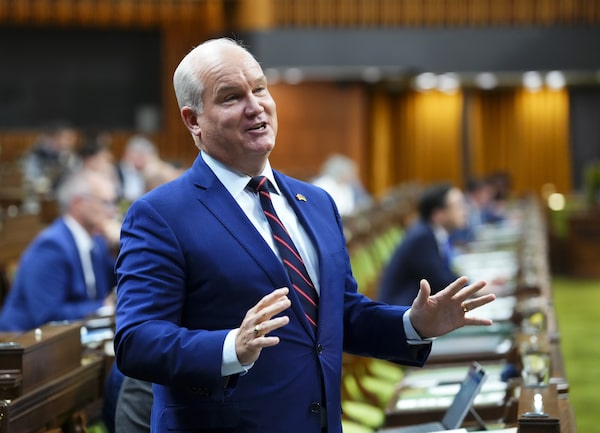
Conservative MP and former Conservative leader Erin O’Toole is given a standing ovation as he delivers his final speech in the House of Commons on Parliament Hill in Ottawa, on June 12.Sean Kilpatrick/The Canadian Press
If Erin O’Toole was a more vitriolic man, his final speech in the House of Commons might have burned a few bridges. But the departing former Conservative leader chose to speak a lot about political vitriol and kept his rebukes polite.
Even so, you didn’t have to read much into his words to see that he was not just fretting about the state of the Canadian political world he is leaving but admonishing some of the people sitting in the chamber around him – and not just Liberals across the aisle but MPs on his own side, including the leader who succeeded him, Pierre Poilievre.
“Performance politics is fuelling polarization. Virtue signalling is replacing discussion,” Mr. O’Toole said. “And far too often we are just using this chamber to generate clips, not to start national debates.”
And if that was a general warning to all around him, there were others undoubtedly aimed at MPs in the Conservative Party he once led – including for pandering to conspiracy theories about the United Nations or the World Economic Forum rather than calling them out.
“If we do this more, we are allowing others to define the debate for us and risk allowing others to set the course for this country, because too many members on all sides of this chamber – and from time to time I have been guilty of it myself – are becoming followers of our followers when we should be leaders,” he said.
No one could miss the fact that that was addressed at Mr. Poilievre and the MPs in his own Conservative Party who wink at the notion that the WEF – an organization that convenes an annual confab of chief executives and political leaders in Davos, Switzerland – is actually a multitentacled global cabal that secretly controls the government of Canada. Instead of debunking the idea, Mr. Poilievre has promised he wouldn’t let Conservative cabinet ministers go to Davos.
But Mr. O’Toole’s criticism was part of a broad lecture about the dangers of divisive politics, and delivered gently enough that Mr. Poilievre followed with a gracious tribute to his former leader.
Part of Mr. O’Toole’s goodbye address sounded like an old-school warning about modern dangers. Mr. O’Toole, after all, really is traditionalist at heart: He’s a former Royal Military College cadet and military man who has a particular admiration for First World War prime minister Robert Borden – whom he quoted at the start.
But it was also a former leader delivering his digested lessons from bitter personal experience.
Mr. O’Toole led the Conservatives in the 2021 election when the COVID-19 pandemic was the issue. Prime Minister Justin Trudeau ran a wedge-politics campaign against him, accusing him of supporting anti-vaxxers against vaccine mandates, while a clutch of his own MPs opposed such measures. One of his MPs gave the caucus a presentation on ivermectin as an alternative to vaccines. He lost his party’s leadership when he didn’t embrace the truckers convoy protests of 2022.
His 2021 election campaign also took serious damage from attacks on his gun policy, and Mr. O’Toole certainly sees that as divisive politics that eschewed Canada’s traditions by demonizing hunters.
“Whole rural swaths of our country are being held up as the problem, only to secure a few political points in the suburbs,” he said.
Of course, Mr. O’Toole can’t now escape the fact that he was also a player in divisive politics – as he more or less admitted. But his larger point about divisiveness wasn’t just about the vitriolic nature of politics now, but the danger that politicians are helping to tear the national fabric apart.
He said an unnamed Liberal MP had told him they can no longer speak to their brother because of the vaccine debates in the 2021 election. He blamed politicians for being governed by algorithms and chasing likes online, and warned darkly that social media is starting to tear Canadian democracy apart.
“If we are not careful, there will soon be a generation of young voters who have never even heard a point of view different from their own,” Mr. O’Toole said. “I fear the ignorance of the views of others will slowly transform into a dislike of others, and we can see that starting to happen.”
 Campbell Clark
Campbell Clark